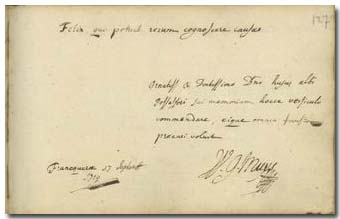
Felix, qui potuit rerum cognoscere causas. *
Ornatiss[imo] & Doctissimo D[omin]o hujus albi Possessori sui
memoriam hocce versiculo commendare, eique omnia fausta precari
voluit
W[yer] G[ulielmus] Muys
Franequerae 17 Septemb. 1719
|
* Virgil,
Georgica 2.490. In the English translation by J. B.
Greenenough: “Happy, who had the skill to understand / Nature's
hid causes.” Also quoted by
János Csúzi on
p. 339.
|
|
|
Happy is who could get to know the reasons of things. *
I intend to recommend myself into the memory of
the eminent and learned possessor of this album with this short
verse, and wish him all the best things.
Wyer Gulielmus Muys
In Franeker, on September 17, 1719.
|
p.
127. Franeker, September 17, 1719
Muys, Wyer Gulielmus
(1682-1744),
Dutch professor of medicine
Wyer Gulielmus Muys (Wijer Willem Muijs) was born on January 5, 1682
in Steenwijk (Overijssel), a son of Mayor Johannes Muys and Maria
Schulting. He studied in Leiden, received his doctoral degree in
1701 in Utrecht, and practised in Arnheim. In 1709 he was
appointed professor of mathematics at the university of Franeker,
and in the same year he was elected member of the Scholarly
Society in Berlin. Later he also became professor of medicine,
chemistry and botanics. He died on April 19, 1744. His works also
indicate his versatile talent: Elementa physices methodo mathematica
demonstrata, quibus accedent dissertationes duae de causa
soliditatis corporum et de causa resistentiae fluidorum.
Amsterdam, 1711. – Dissertatio & observationes de salis
ammoniaci praeclaro ad febres intermittentes usu … Franeker,
1716. – Investigatio fabricae quae in partibus musculos
componentibus extat … Leiden, 1741. – Diss. II de materia
luminis, seu ignis, caloris et lucis natura. – Or. inaug.
de usu matheseos in perficiendo judicio & ingenio,
Franeker, 1711. – Oratio inauguralis de theoriae medicae usu atque recta
illam excolendi ratione … Franeker, 1714. – Infundibulum
grammaticae Latinae sive LI ecercitia Latina et Germanica …
Berlin, 1732.
•
AlbUtr 102 • Boeles II 373 • Jöcher • Jöcher-Adelung
|

